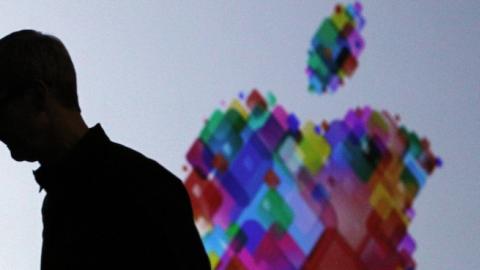In Tim Cook’s open letter explaining Apple’s refusal to defeat the encryption key on Syed Rizwan Farook’s iPhone, the CEO challenges the assumption that unlocking the terrorist’s phone is in the interest of public security. According to Cook’s logic, the FBI’s request will make Americans “less safe,” and it is precisely by challenging the court order that Apple protects the public. But Cook fools no one by claiming to be a defender of public security. His defiance of a court order to decrypt Farook’s iPhone is at best naive.
Cook has positioned himself as no less concerned with security than the FBI—as if Apple and the government are merely pursuing the same end through different means. He invokes Apple’s record of cooperation with law enforcement, citing Apple’s willingness to lend its own engineers to aid the FBI. However, he draws the line in the matter of unlocking Farook’s iPhone, claiming that the creation of a “backdoor” for one device will expose Apple customers to a greater risk of criminal hacking—a clear threat to public security.
Of course protecting customers from criminal hacking is a laudable pursuit. As far as public security is concerned, however, deterring hypothetical hackers is not commensurate with recovering invaluable information from a known terrorist’s phone. It is one thing to claim that the privacy interests involved in protecting the encryption key outweigh the security benefits of accessing Farook’s iPhone data. But it is quite another to hold that Apple’s position is just as committed to public safety as the FBI’s.
Apple is of course free to challenge FBI subpoenas and search warrants. However, a federal magistrate judge weighed the concerns of both the FBI and Apple carefully before issuing the order—including whether the request subjected Apple to an undue burden—and found that the benefits of the order outweighed the hardship to Apple. Apple now claims not merely more concern for security than the FBI, but also to have better judgment than the federal courts.
Notwithstanding Apple’s interest in maintaining strong encryption technology, it is hard to accept Apple’s intransigence in such exceptional circumstances. After all, it is difficult to imagine a more appropriate context where security ought to trump privacy than a one-time order to unlock a single phone used by a dead terrorist. Cook’s stance—refusing to undermine Apple’s encryption platform, regardless of the security interests at issue—borders on an ideology that allows no exception to privacy, no matter the stakes.
This is not the first time Cook has taken such a dogmatic position in the privacy vs. security debate. In a speech last summer, Cook argued that more encryption is always the right answer and denied—bizarrely—the inherent inconsistency between privacy and security. This position is obviously false; the two principles are at odds by definition. Rather than claiming to have brilliantly synthesized these competing values, Cook should admit that Apple made a tradeoff. By claiming that its iPhone by design precludes access by law enforcement under any circumstances, Apple planted its flag squarely on the side of privacy.
At the same time, it is disingenuous to take such a categorical position when Apple’s privacy stance has not been consistent across its line of products. Apple has yet to explain why iCloud—the subject of the infamous celebrity hacking scandal of 2014—lacks the same privacy barriers as the iPhone device. And while the company has refused to override the encryption key on Farook’s phone, Apple gave the FBI backdoor access to Farook’s iCloud data. Apple may be a technological wonder, but it is not a privacy panacea.
It is tempting to claim adherence to universal principles, but the world is full of gray areas, and good policy sometimes requires flexibility, and a careful examination of the particulars. Apple’s professed zeal for privacy is popular among consumers, and encryption is an effective tool in thwarting hackers. But not even Apple is a purist with respect to customer privacy. And it is wrong for Cook to pretend that Apple’s position is without tradeoffs for public security. The integrity of the iPhone encryption key may warrant protection—just not at any cost.


















